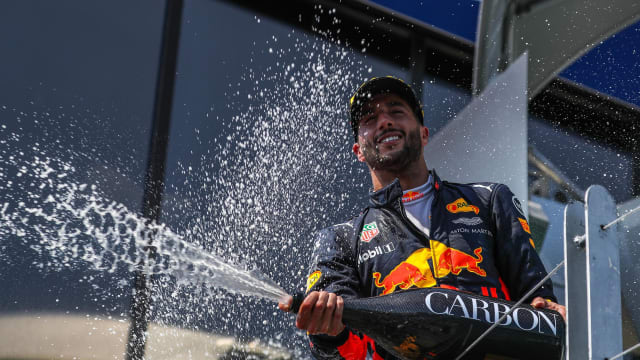Q: Cyril, there have been a lot of changes at the Renault team since it became a works squad again - including hiring a lot of people. In what stage of the transformation process are you right now? And when will it be finished so that you can go out racing for podium positions?
Cyril Abiteboul: On the factory side we are fairly advanced - we are completely in line with our plan. We have not backed off in terms of investment. We have 20 percent more people on our chassis side in Enstone and we will have a new head of aerodynamics who is joining us in two weeks’ time.
Q: Who is that?
CA: The number two at the aero-department of Red Bull Racing, Peter Machin. He will be our number one in aerodynamics. That shows that we have a lot of respect for Red Bull. So the factory is sorted. The track is more difficult. We have the emergence of results. There is huge pressure to score more than we have so far. Also given our history. We are 40 years in Formula 1 this season - and these four decades are full of success with the biggest names in F1. There is that pressure - but we also know that it takes a bit of time.
Q: So it is paramount not to panic?
CA: Yes, no panic!
Q: Nico Hulkenberg is a very respected name in the paddock. Is he the ‘development’ driver that the team needs right now?
CA: Nico is a leader. He is leading the team from every possible angle. He is charismatic and has a fantastic reputation. But he also has a point to make. He is just like us right now: we have a name - now we have something to prove. We both want to win races and fight for the championship in the next few years. And to push everything forward as fast as possible we needed a driver who is able to set priorities and give directions. And he has all that.
Q: You have ruled out Red Bull’s hopes of a major engine upgrade for the next round in Azerbaijan, but what can be expected when in terms of updates?
CA: There are upgrades permanently - every single race we are making some small improvements. Last year we created a huge expectation and we came with an upgrade that had a big impact. But we can’t repeat that every year. Now it is all about constant improvements which overall will make a difference – but there is no magic bullet. Every race the engine will become more and more reliable with the program on the dyno progressing. Frankly, the next big upgrade will be next year. Then we will have a completely new concept. That will make a difference - but as I said, 2018.
Q: Looking further ahead, teams have recently submitted their visions of the F1 engine beyond 2020 to the FIA. What is Renault’s vision?
CA: If I want to keep it simple and short – as this is a vast field – we say the engine is still important in a car. We are carmakers and the engine is the heart of the automotive industry, so we believe that it needs to be the prevailing factor in Formula One. Having said that, we need to find a better balance than the situation we have now, where the pecking order of the grid is basically the ranking of the engines - which is not healthy for the sport. So yes, we need a better balance between the engine as performance differentiator and the fact that a team with a fantastic chassis can also be hugely successful. That is firstly.
Secondly we do believe in electrification. The world is going towards lower emissions, so Formula 1 cannot turn its back to this evolution so we need electrification. All cars will be hybrid in the future. For sure we don’t mean fully electric cars. It is all about balancing between combustion engines – as this is where the DNA of Formula 1 is – and electrification. Then it is much about finding the right balance between the technology and the show. Maybe right now we have an engine that is too complex and too heavy – and is not producing enough sound and horsepower. But we are open for any discussions in that direction.
We have made a proposition to keep the current engine, but increase the fuel flow and increase the sound. And we have made a second proposal, which will be a simplification of the current engine by removing some of its elements but still keeping electrification and fuel efficiency.
Q: A major demand is cost reduction. Very important to some of the smaller teams…
CA: I understand that, as I myself have been with a small independent team. But at the same time if you take the annual costs of running a Formula 1 team and look at the element of the engine costs – take $12 million for the engines per year as this are the costs that also the FIA estimates – and take the fact that most of the teams operate on a budget of 100 million euro – then the engine would make not more than 12 percent. Is that really shocking? I am not massively shocked. What we need is stability in the regulations – that would bring costs down and enhance the show. We should not go back to a ‘from-scratch’ concept as that would throw us back to 2014 - and nobody really wants that. Small improvements to the regulations to optimize the package – that would make sense.
Q: Everybody seems to agree that an engine solution for past 2020 has to be found by the end of this season. Will fear over the future of Formula 1 be the decision maker in the end?
CA: Well, at the end of the day Formula 1 always has a fantastic capacity to find a solution! (Laughs) Look at Red Bull. Two years ago everybody was panicking that Red Bull could disappear from Formula 1 - and eventually things were sorted out by itself. So I would stay calm, as I don’t think that there is any emergency situation for anyone. Yes, McLaren has its own situation to sort out with Honda. But the best situation for Honda would be to find stability, as with time I am sure Honda is capable of doing a good job. We need some calm about things – as Ross Brawn is doing. I have all the confidence in the world that Ross Brawn will be making the right decision for the future.
Q: Your client Red Bull wants an independent engine manufacturer. Can you see their point? And is it feasible, given the fact that it takes years to develop a sound power train?
CA: There are a lot of high hopes in regards to independent engine manufacturers, but frankly you have to go back a long time in history to find a real independent engine manufacturer. Everybody has Cosworth in mind, but Cosworth was subsidised by Ford. And should there be an independent engine manufacturer, the technology would have to be low end – and that would be inappropriate for Formula 1 as the peak of motorsport. We still have to have a sophisticated technology, as that is part of the footprint of the sport.



















